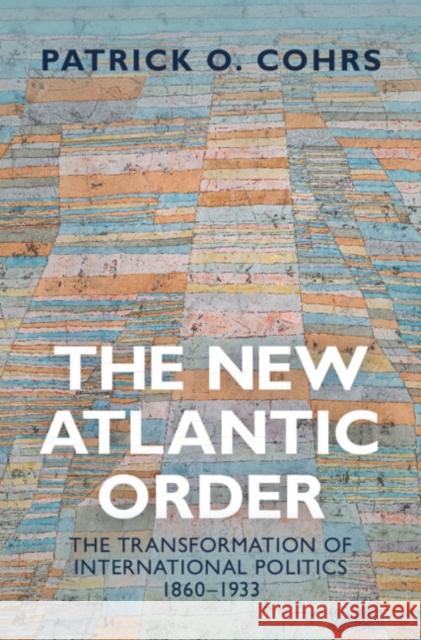The New Atlantic Order: The Transformation of International Politics, 1860-1933 » książka



The New Atlantic Order: The Transformation of International Politics, 1860-1933
ISBN-13: 9781107117976 / Angielski / Twarda / 2022 / 550 str.
The New Atlantic Order: The Transformation of International Politics, 1860-1933
ISBN-13: 9781107117976 / Angielski / Twarda / 2022 / 550 str.
(netto: 190,46 VAT: 5%)
Najniższa cena z 30 dni: 197,14
ok. 16-18 dni roboczych.
Darmowa dostawa!
Sheds new light on a transformation process: the struggle to create a modern Atlantic order in the long twentieth century.
'Cohrs goes much further than before (in his new interpretation of the transformation of world order in the long 20th century) … He strongly focuses on the peace settlement after the First World War and here highlights his leitmotif of a new transatlantic order. Yet his approach is always directed at the international order as a whole … (Cohrs argues that) the pre-war era and the Great War would have required a radical transformation of the international system … based on international law and liberal-progressive foundations, reinforced through transnational democratisation processes and pivoted on the League of Nations … A significant scholarly achievement sui generis … (Cohrs' new book is) all in all an admirably tight and comprehensive study.' Jost Dülffer, Historische Zeitschrift
Contents; Acknowledgements; Abbreviations; List of maps; Introduction; Part I. Inevitable Descent into the Abyss?: The Wider Pre-History of the Great War. The Involution of International Politics at the Dawn of the “Long” 20th Century: 1. Peace through equilibrium. The 19th century's Vienna system – and its disintegration; 2. Transformation and corrosion. The turn towards power politics and global imperialist competition in the formative decades of the “long” 20th century; 3. The “ascent” of an exceptionalist world power. The American special path and ephemeral aspirations for an Atlantic order of empires; 4. Counterforces – and first visions of a novel transatlantic peace. Internationalist aspirations to overcome imperialist power politics before 1914; 5. The unavoidable war? Long and short roads to the catastrophe of 1914; Part II. The Greatest War – and No Peace Without Victory: The Impact of the First World War, Competing Visions of Peace and the Struggle over the Shape of a New – Atlantic – World Order: 6. Tectonic changes. The consequences of the war and the transformation of the transatlantic constellation; 7. The political and ideological “war within the war”. The transatlantic competition over the shape of the postwar order; 8. No “peace without victory” – and the making of the frail Atlantic armistice of November 1918; 9. No prospects for a lasting peace? The urgent and the systemic challenges of peacemaking and the need for a new Atlantic order; Part III. Reorientations and Incipient Learning Processes: The Dominant – Atlantic – Approaches to Peace and Order after the Great War: 10. Towards a progressive Atlantic peace of the victors. The reorientation of American approaches to peace and international order; 11. The search for a new equilibrium – and an Atlantic concert. The reorientation of British approaches to peace and international order; 12. The search for security and an Atlantic alliance of the victors. The reorientation of French approaches to peace and international order; 13. A new beginning? German pursuits of a Wilsonian “peace of justice” and first steps towards an Atlanticist foreign policy; Part IV. No “Pax Atlantica”: The First Attempt to Found a Modern Atlantic Order – and its Frustration: 14. An impossible peace? The incomplete transatlantic peacemaking process of 1919; 15. Novel superstructure of a new Atlantic order? The struggle to found the League of Nations and the limitations of the covenant of 1919; 16. No just peace without security. The pivotal German settlement and the struggle to found a new Atlantic security system; 17. The eastern frontiers – and limits – of the new order. Self-determination, the critical Polish-German question and the wider challenges of “reorganising” Eastern Europe; 18. A formative threat? The Western powers and the Bolshevik challenge; 19. The political and moral stakes of reparations – and the limited advances towards a new Atlantic economic order; 20. The imposed peace. The missed opportunity of a negotiated settlement with Germany?; 21. The truncated Atlantic peace order of 1919 – a re-appraisal; Part V. Epilogue: The Political Consequences of the Peace: The Challenges after Versailles and the Making of the Unfinished Atlantic Peace of the 1920s: 22. Peace undermined. The divergent outlooks of the victors, the consequences of Wilson's defeat and the escalation of Europe's postwar crisis; 23. Towards a new order. Constructive learning processes and the construction of an Atlantic peace beyond Versailles; 24. The remarkable consolidation of the nascent Pax Atlantica of the 1920s – and its dissolution under the impact of the world economic crisis; Part VI. Final Perspectives – the Cadmeian Peace: 25. The eventual creation of the “long” 20th century's Atlantic order after 1945 and the crucial lessons of the era of the First World War; Bibliography.
1997-2026 DolnySlask.com Agencja Internetowa
KrainaKsiazek.PL - Księgarnia Internetowa









